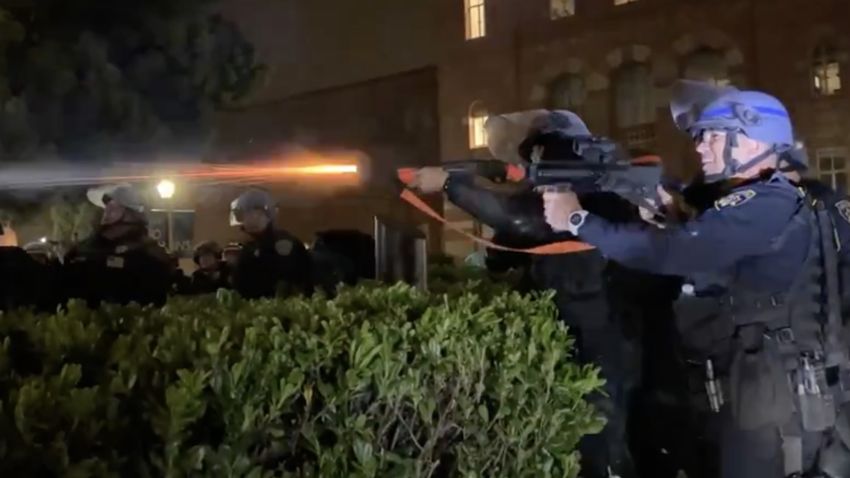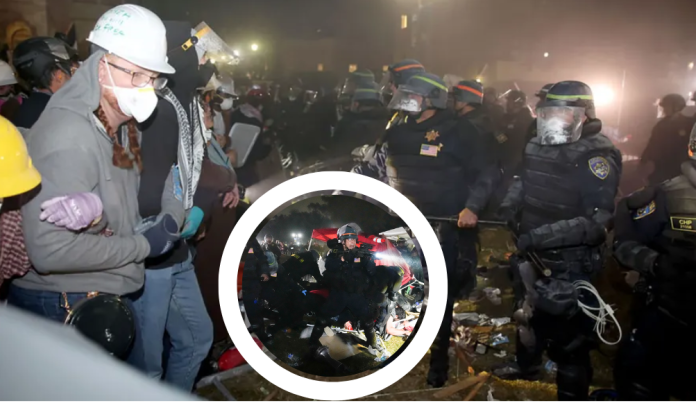- The situation at UCLA deteriorated rapidly, with police resorting to the use of rubber bullets to disperse protesters, leading to injuries and arrests.
- The pro-Palestinian encampment lasted over a week, attracting a significant number of supporters and drawing attention to the conflict.
- The police action received criticism for its intensity and the use of rubber bullets, while the protests themselves were supported by some as a form of expression and solidarity.
- The events had a profound impact on the UCLA community, affecting relationships between students, faculty, and local residents, and raising questions about the university’s role in managing such protests.
Newsypeople – UCLA protests: Police fire rubber bullets at pro-Palestinian protesters, The recent protests at UCLA involving pro-Palestinian demonstrators and law enforcement have escalated into a tense situation, marked by clashes and the dismantling of a fortified encampment by police. These events have garnered significant attention both domestically and internationally, with live coverage on various media outlets, including Iranian state television, Qatar’s pan-Arab Al Jazeera satellite network, and Israeli television networks.
The situation began with a large gathering of more than 1,000 protesters, both inside and outside a barricaded tent encampment on the UCLA campus. The protesters, many of whom wore helmets and gas masks, were advocating for universities to cease doing business with Israel or companies they believe support the war in Gaza. This movement has spread across campuses nationwide, marking a unique student protest movement this century.

The atmosphere turned tense as police, including California Highway Patrol officers, arrived in force, wearing face shields and protective vests. They attempted to separate themselves from the demonstrators, who chanted slogans such as “You want peace. We want justice.” The police methodically dismantled the encampment’s barricade, which was constructed from plywood, pallets, metal fences, and trash dumpsters, and began pulling down canopies and tents. The number of protesters appeared to decrease throughout the morning as some voluntarily left with their hands up, while others were detained.
Don’t Miss | Who is Christopher Gregor? New Jersey Dad Accused of Forcing 6-Year-Old Son to Run on Treadmill Before Death
This police action followed a night of violence instigated by counter-protesters, who attacked the pro-Palestinian encampment by throwing traffic cones, releasing pepper spray, and tearing down barriers. The fighting lasted for several hours before police intervened, but no arrests were made. At least 15 protesters suffered injuries, and the delayed response by authorities drew criticism from political leaders, Muslim students, and advocacy groups.
Hundreds of pro-Palestinian protesters remain on UCLA campus despite police ordering them to leave https://t.co/59IBFqN6UA
— The Associated Press (@AP) May 2, 2024
The UCLA administration and campus police faced scrutiny for their handling of the situation, particularly for the delay in responding to the counter-protesters’ attack. In response, UCLA Chancellor Gene Block announced a review of the events, and the head of the University of California system, Michael Drake, ordered an independent review of the university’s planning, actions, and the response by law enforcement.
The protests and subsequent police action at UCLA are part of a broader trend of pro-Palestinian demonstrations on college campuses across the U.S., mirroring actions taken against larger protest movements in the past, such as those against the Vietnam War. These events have sparked debates about free speech, the role of universities in political activism, and the handling of protests by law enforcement.

As the situation unfolds, it remains a focal point of national and international attention, highlighting the complexities and tensions surrounding the Israel-Palestine conflict and its impact on American college campuses.
Don’t Miss | Beyoncé and Jay-Z Disguised for Dinner in Japan



